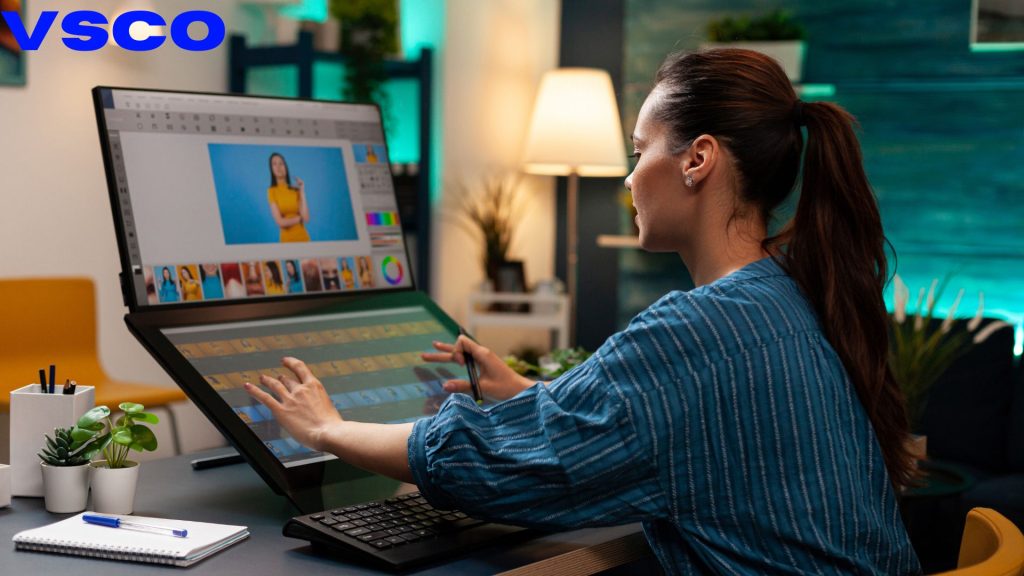VSCO has emerged as a go-to editing app for creatives seeking to add an aesthetic edge to their photos. With its wide variety of filters, easy-to-use interface, and advanced editing tools, it allows users to transform ordinary shots into visual masterpieces. Photographers, influencers, and everyday users rely on VSCO not just for quick edits but also for curating a distinct visual identity. The presets and manual tools offer flexibility, allowing you to achieve a minimal, moody, vintage, or vibrant photo finish.
VSCO isn’t just another filter app it’s a visual toolkit for anyone looking to create beautiful photos. Learning how to use its filters and tools effectively can significantly enhance your entire social media presence and create a cohesive feed.
Understanding VSCO’s Core Features
Why VSCO Leads Photo Editing Apps
VSCO provides a seamless editing experience with high-quality filters and presets that cater to every style. It blends simplicity with depth, offering tools that even professionals appreciate. With easy navigation and intuitive design, VSCO enables users to create polished edits without a steep learning curve.
Exploring VSCO’s Editing Tools
From exposure to contrast and grain to fade, each VSCO tool serves a purpose. The app allows precise adjustments that enhance mood and clarity in every photo. Features like color temperature and tint offer more control over the tone and harmony of your images.
Key VSCO Terms Every User Should Know
Presets, Filters, and Tools Explained
Presets are pre-designed editing combinations that offer specific looks, such as warm vintage or crisp modern tones. Filters adjust color, lighting, and texture to achieve dramatic or subtle changes. Editing tools enable you to fine-tune photos beyond simply applying a preset, from adjusting shadow details to controlling highlights.
Learning the Language of VSCO
Understanding terms like “grain,” “fade,” and “temperature” helps you navigate the editing process more effectively. Each effect plays a unique role in how your final image feels—adding nostalgia, softness, or vibrance as needed.
Best VSCO Filters for Aesthetic Photography
Popular Filters That Define Style
Some filters have become iconic for aesthetic photography:
- C Series: Adds clarity and color pop for vibrant shots
- A Series: Ideal for vintage tones and film-like softness
- M Series: Perfect for muted, moody edits with a cinematic feel
Each filter can transform an image’s personality with minimal effort. Playing with intensity helps create subtlety or boldness, depending on the mood.
Creating a Vintage Feel Using VSCO Presets
Bringing Retro Vibes to Your Photos
VSCO presets like A6 and M5 are perfect for those wanting an old-school vibe. These filters recreate the warmth and grain of film photography, bringing nostalgic charm to your images. Adjusting exposure, fade, and saturation helps further enhance this look.
Personalizing the Vintage Edit
Adding warm tones or slight vignettes strengthens the retro feel. Combine filters with contrast adjustments and manual tweaks to create a timeless aesthetic that aligns with your unique creative vision.
Mastering Advanced Editing Tools in VSCO
Precision Editing for Professionals
VSCO’s advanced tools allow users to go beyond basic edits. Fine-tune highlights, shadow balance, saturation, and sharpness with slider controls. This is ideal for users who want more than just one-click results.
Essential Features for Standout Photos
Use grain for a textured feel, fade to soften shadows, and color temperature to shift the photo’s overall tone. These subtle changes collectively shape a visual identity that stands out across platforms.
Mixing VSCO Filters for a Unique Look
Combining Presets for Visual Depth
Don’t settle for a single preset—blend different filters and tools to create your visual recipe. For example, start with a C1 filter, then adjust grain and contrast for added atmosphere. This layering approach produces depth and individuality in every edit.
Creating Balance and Cohesion
Carefully adjusting filter strength helps retain natural tones while enhancing key features. Aim for cohesion in color and lighting to maintain a consistent and professional aesthetic.
Ideal VSCO Presets for Different Photography Styles
Portrait Enhancements with Soft Filters
Presets like A4 and M5 warm up skin tones and soften facial features. These are great for creating editorial-style portraits that feel both natural and polished.
Landscape Presets That Bring Nature Alive
Filters such as C2 or J5 elevate colors in skies, mountains, or forests. These presets add clarity, saturation, and dimension, making landscapes more captivating.
Urban Photography with Bold Impact
Presets like M3 or B6 add grit, contrast, and increased shadow intensity, making them perfect for cityscapes or architectural shots. These filters emphasize texture and light in urban scenes.
Keeping Your Feed Aesthetic with VSCO

Creating Visual Consistency
Use the same set of filters and editing styles across all posts to maintain a unified feed. Choose a color palette and stick with it—warm tones, cool blues, or neutral shadows.
VSCO Tools That Help Brand Your Feed
Adjust white balance, apply fade effects, and use consistent exposure settings. This makes your photos instantly recognizable and aligned with your visual theme.
Common Editing Mistakes and How to Avoid Them
Overusing Filters or Effects
Using filters too strongly can ruin image quality. It’s essential to scale back and aim for natural-looking enhancements. Avoid over-saturating colors or making contrast too extreme.
Forgetting to Save Custom Presets
If you find a filter combination that works, save it as a custom recipe. This helps maintain editing consistency without requiring the same manual steps to be repeated.
Maintaining High Image Quality in VSCO
Editing Without Compromising Resolution
Avoid gratuitous cropping or auto-enhancements that may obscure fine details. Rely on manual adjustments to fine-tune brightness, sharpness, and clarity while preserving optimal image fidelity.
Innovative Use of Exposure and Contrast
Subtle exposure adjustments can significantly enhance image aesthetics. Balanced contrast preserves image depth and color separation, making photos appear professionally edited.
Building a Custom VSCO Recipe
Designing Your Signature Look
Begin by selecting a base preset that matches your vision. Add grain, reduce fade, or adjust the temperature based on the mood you’re aiming for. Tweak settings until the photo feels unique and aligned with your brand.
Saving and Replicating Your Recipe
Once you’ve built a style, save it as a custom preset. Use it across your future photos to ensure consistency and efficiency in editing.
FAQs
What makes VSCO filters distinct from those of other apps?
VSCO filters are designed with artistic precision, offering cinematic tones and subtle color grading that feel natural and film-like.
Can beginners use VSCO easily?
Yes, the app’s interface is beginner-friendly while still offering advanced tools for those who want more control.
How do I create my own VSCO recipe?
Start with a preset, adjust settings like exposure and color, then save it under “custom” to use across future edits.
What filters are best for portraits?
A4, M5, and S2 are commonly used for their warm tones and ability to softly enhance skin tones.
Is it better to use one filter or combine multiple?
Combining filters with manual edits provides more flexibility, allowing you to develop a signature style that is uniquely yours and reflects your brand.
Conclusion
VSCO empowers users to master aesthetic photography through creative presets and advanced editing tools. It encourages experimentation while maintaining visual consistency. Whether you’re editing portraits, landscapes, or lifestyle shots, VSCO helps you craft visually compelling stories. With each filter and adjustment, your photos gain personality, style, and emotional depth.


